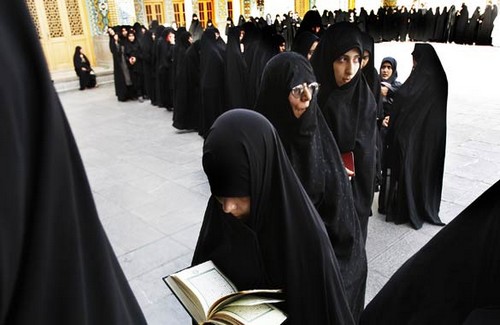Will Women Participate in Iran's Parliamentary Elections?
13:51 - 7 February 2012

In examining the eight Islamic Republic parliaments, from the very first Parliament, which included only four women, despite the historic role that women played in the success of the 1979 Iranian Revolution, to the fourth one, in which a record 14 women became lawmakers, and then to the sixth Parliament, which did the most to address women’s demands, we will note little actual progress beyond minor alterations to some discriminatory laws such as those concerning inheritance and child custody, and even those changes were due to the fierce struggles of women’s rights activists, who drew public attention to the inequity of these laws.
Our examination will also reveal that Members of Parliament have shown no real will to bring about change, and even when women’s issues weren’t being completely ignored, the smallest of reforms could not be realized because they require the Supreme Leader’s ultimate approval.
In fact, as women have become more informed and tried to present their demands in the social and public arenas, discrimination and inequality have risen to greater heights. The more that our presence is felt in society and the more visible our struggle for equality becomes, the more the government becomes defensive and puts up a fierce guard against women, dashing any hope that the government may at least give in to a bare minimum of what is demanded. The vast numbers of women graduating from universities have alarmed the government, jolting it to pass restrictive legislation, such as university quotas based on gender and location, which target women and encourage them to stay at home.
It should also be noted that bills aimed at restricting women are quickly passed and implemented, while the few articles that could actually benefit women’s rights are doomed to oblivion, except when they briefly re-emerge as empty election promises. The bill regarding insurance for homemakers, which was passed in Parliament nine years ago, has never seen the light of day. But as the parliamentary elections approach, promises to implement the law can be heard once more.
The capacity and strength of Parliament to realize women’s demands
Considering the structure of the constitution, the Islamic Republic Parliament cannot even at its best bring about a miracle. A look at the report card of the sixth Parliament, the most reform-oriented group of lawmakers, makes this evident.
Motions passed in Parliament must be approved by the Guardian Council and the leader of the Islamic Republic, and naturally with the ultra-conservative bent of these two institutions, most of the bills that could benefit women’s lives are deemed in violation of Islamic laws.
Unfortunately, the leadership’s will consistently outweighs that of the people and the Members of Parliament.
For example, the law allowing women to inherit land and property was passed in the sixth Parliament but it was left on the shelf until February of 2009, when Ayatollah Khamenei suddenly approved it. That led to the bill’s swift passage through the Guardian Council and, finally, in the run-up to the 2009 presidential elections, it was put into action with widespread publicity.
In another instance, in connection with protests against the controversial Family Protection bill, we had gone to Parliament to deliver our 5,000-signature petition. MP Zohreh Elahian, a member of Parliament’s Legal-Judicial Commission, helped us spread out our banners on the commission’s tables, banners that proclaimed “Polygamy prohibited!” She told us: “The Supreme Leader is also opposed to polygamy!” This meant we were all opposed to polygamy, including the leader, but we must wait for direct orders. Our hopes were dashed, however, when the leader did not show any opposition to the controversial Family Protection act and its 23rd article allowing polygamy. Later in the media, Zohreh Elahian began supporting the very articles she had claimed to oppose.
Will women remain silent?
I will bring these conjectures to an end with a few questions: What kind of parliament will the ninth Parliament be in view of the current situation and the refusal of candidates to commit to any of the people’s demands? What is the essence of an election that has begun with the arrest of numerous journalists, both women and men? Do these elections hold any attraction for informed Iranian women? Will women commit themselves to another election process in March? What if they’ve witnessed the “death of Neda”, that symbol of the Iranian election protest movement, and seen how their votes were disregarded in the tenth presidential election, while peaceful demonstrators demanding a recount were fiercely put down?
The ninth parliamentary elections are scheduled to take place in the week leading up to International Women’s Day, March 8. Iranian women, especially young women who are the majority of Iran’s female population and the main protagonists in the arena of struggle for equal rights, will keep protesting against discriminatory laws, knowing full well that they have a long struggle ahead of them on the path to equality.
By: Radio Zamaneh
Our examination will also reveal that Members of Parliament have shown no real will to bring about change, and even when women’s issues weren’t being completely ignored, the smallest of reforms could not be realized because they require the Supreme Leader’s ultimate approval.
In fact, as women have become more informed and tried to present their demands in the social and public arenas, discrimination and inequality have risen to greater heights. The more that our presence is felt in society and the more visible our struggle for equality becomes, the more the government becomes defensive and puts up a fierce guard against women, dashing any hope that the government may at least give in to a bare minimum of what is demanded. The vast numbers of women graduating from universities have alarmed the government, jolting it to pass restrictive legislation, such as university quotas based on gender and location, which target women and encourage them to stay at home.
It should also be noted that bills aimed at restricting women are quickly passed and implemented, while the few articles that could actually benefit women’s rights are doomed to oblivion, except when they briefly re-emerge as empty election promises. The bill regarding insurance for homemakers, which was passed in Parliament nine years ago, has never seen the light of day. But as the parliamentary elections approach, promises to implement the law can be heard once more.
The capacity and strength of Parliament to realize women’s demands
Considering the structure of the constitution, the Islamic Republic Parliament cannot even at its best bring about a miracle. A look at the report card of the sixth Parliament, the most reform-oriented group of lawmakers, makes this evident.
Motions passed in Parliament must be approved by the Guardian Council and the leader of the Islamic Republic, and naturally with the ultra-conservative bent of these two institutions, most of the bills that could benefit women’s lives are deemed in violation of Islamic laws.
Unfortunately, the leadership’s will consistently outweighs that of the people and the Members of Parliament.
For example, the law allowing women to inherit land and property was passed in the sixth Parliament but it was left on the shelf until February of 2009, when Ayatollah Khamenei suddenly approved it. That led to the bill’s swift passage through the Guardian Council and, finally, in the run-up to the 2009 presidential elections, it was put into action with widespread publicity.
In another instance, in connection with protests against the controversial Family Protection bill, we had gone to Parliament to deliver our 5,000-signature petition. MP Zohreh Elahian, a member of Parliament’s Legal-Judicial Commission, helped us spread out our banners on the commission’s tables, banners that proclaimed “Polygamy prohibited!” She told us: “The Supreme Leader is also opposed to polygamy!” This meant we were all opposed to polygamy, including the leader, but we must wait for direct orders. Our hopes were dashed, however, when the leader did not show any opposition to the controversial Family Protection act and its 23rd article allowing polygamy. Later in the media, Zohreh Elahian began supporting the very articles she had claimed to oppose.
Will women remain silent?
I will bring these conjectures to an end with a few questions: What kind of parliament will the ninth Parliament be in view of the current situation and the refusal of candidates to commit to any of the people’s demands? What is the essence of an election that has begun with the arrest of numerous journalists, both women and men? Do these elections hold any attraction for informed Iranian women? Will women commit themselves to another election process in March? What if they’ve witnessed the “death of Neda”, that symbol of the Iranian election protest movement, and seen how their votes were disregarded in the tenth presidential election, while peaceful demonstrators demanding a recount were fiercely put down?
The ninth parliamentary elections are scheduled to take place in the week leading up to International Women’s Day, March 8. Iranian women, especially young women who are the majority of Iran’s female population and the main protagonists in the arena of struggle for equal rights, will keep protesting against discriminatory laws, knowing full well that they have a long struggle ahead of them on the path to equality.
By: Radio Zamaneh



